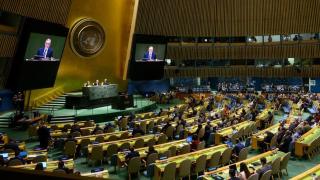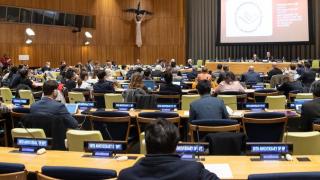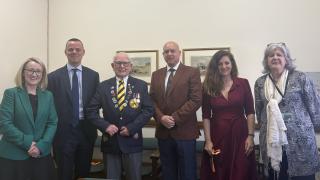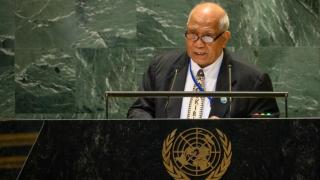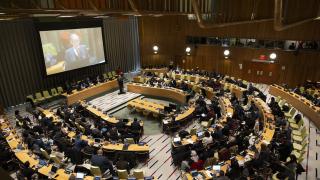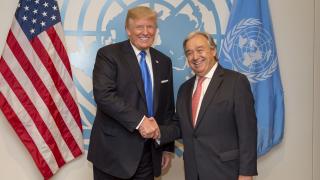
As UNA-UK made clear in its statement on President Trump’s election: as a UN-focussed, UK-based charity, we do not take a position on US politics. Nor do we generally comment on the visits of foreign leaders to the UK (although we have done so on occasion). However, we have been deeply concerned by a number of the Trump Administration’s decisions that pose a threat to the rules-based international system on which people in the UK, US and the wider world depend.
Many of this Administration’s actions have attracted criticism from across the political spectrum, including within the UK. Over the past two years UNA-UK has felt compelled to put out statements denouncing the migration ban on religious lines, the withdrawal from the Iran and Paris deals, the defunding of the UN Relief and Works Agency for Palestinian Refugees, the opening of an embassy in Jerusalem and the withdrawal from the Human Rights Council. These issues are of deep concern to UNA-UK’s members and supporters, as are human rights violations – including most recently the separation of babies from their parents at the US border – which have on several occasions required a robust response from the UN High Commissioner for Human Rights.
However, UNA-UK believes that there is always value in diplomatic engagement, as long as that engagement is open eyed and rooted in a comprehensive understanding of the power dynamics of the relationship. The UK continues to describe the US as its closest ally. While we have argued that the UK would be better served by cultivating a wider global network of partners and allies which will better weather increased global polarisation and turbulence, it is true that on many issues, including at the UN Security Council, our relationship with the US will continue to be important.
As President Trump meets with British officials this week, we would like to draw attention to three areas where US policy could have disastrous consequences for the world:
- Climate change - constituencies across the US reaffirmed their support for the Paris Climate Agreement after the White House announced its intention to withdraw, with US states, cities, businesses and communities unveiling ambitious plans to cut emissions. Other countries also rallied around the Agreement. However, by embracing fossil fuels, ending payments to the Green Climate Fund, rolling back car emissions standards, cutting funding for clean energy research, loosening regulations on air pollution, winding down NASA’s climate monitoring programme and much more, this Administration is hindering the world’s ability to tackle one of the biggest challenges to humanity’s future.
- Nuclear weapons – the President has spent much energy touting the success of the meeting with his North Korean counterpart, but there is little evidence to date that it will yield results. Meanwhile, his very different approach to the Iran deal could lead to a reversal of those hard-won gains or – worse – an escalation of tension and conflict in the wider region. The Administration has also taken steps that could encourage an arms race. It has increased the role of nuclear weapons in its military doctrine with plans for smaller, more ‘usable’ nuclear weapons, and by widening the circumstances under which the US would consider using its nuclear arsenal - already the biggest in the world by far. Non-nuclear attacks and attacks on critical infrastructure could now be met with a nuclear response.
- UN budget cuts - the consequences of cutting funding for the United Nations may seem small when compared with the fallout from climate change or nuclear war. But the UN is crucial in preventing both, in addition to delivering a host of other global goods, from conflict resolution to humanitarian relief. The UN has been under increasing strain for many years now, with crises stretching its modest resources to their limit. To date, this Administration has not fulfilled its threats to decimate UN funding. But it has put huge pressure on a number of programmes and agencies, putting lives at risk, and more cuts are in the offing. US enthusiasm for budget cuts is also providing cover for states such as Russia and China to reduce funding to other parts of the UN system, such as the UN’s human rights mechanisms.
The Prime Minister has previously said that “the nature of the relationship is such that we should be able to be frank and open with each other”. As such, UNA-UK trusts that President Trump will not leave these shores in any doubt of the Government’s position on these existential issues.
Photo: Secretary-General António Guterres (right) meets United States President Donald Trump at UNGA last September. UN Photo


